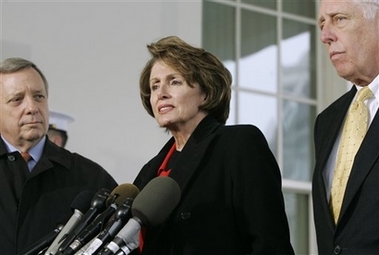House Democrats to unveil Iraq war plan
(AP)Updated: 2007-03-08 22:10
WASHINGTON - In a direct challenge to US President Bush, House Democrats are advancing legislation requiring the withdrawal of US combat troops from Iraq by the fall of next year.
The conditions, described as tentative until presented to the Democratic rank and file Thursday, would be added to legislation providing nearly $100 billion the Bush administration has requested for fighting in Iraq and Afghanistan.
The officials who described the measure did so on condition of anonymity, saying they were not authorized to speak until after it was presented to the Democratic caucus. They also stressed the provisions were tentative until then.
Underscoring the debate among Democrats, several opponents of the war issued a statement late Wednesday saying they "have had a constructive dialogue with members of our party's leadership. ... However, at this time, we have not reached any final agreement."
The statement was issued in the name of Reps. Lynn Woolsey, Barbara Lee and Diane Watson of California; Rep. Jerry Nadler of New York; Rep. Lloyd Doggett of Texas and Rep. Keith Ellison of Minnesota.
Even so, House Speaker Nancy Pelosi's office announced plans for a Thursday news conference to unveil the measure, providing no details. The announcement said she would be joined by Rep. John Murtha, D-Pa., and other key lawmakers. Murtha is chairman of the subcommittee with jurisdiction over the Pentagon's budget and is among the House's most outspoken opponents of the war.
Meanwhile, Gen. David Petraeus said insurgents in Iraq have sought to intensify attacks during a Baghdad security crackdown, which he predicted should not be at full strength until June. Petraeus, the new commander of US forces of Iraq, said Thursday that the backlash has come since US and Iraqi forces began the security sweep three weeks ago. The Pentagon has pledged 17,500 combat troops to the capital.
Petraeus also said additional US forces should head to the Diyala province northeast of Baghdad, but declined to give specifics. Military officials believe many insurgents have shifted from Baghdad to Diyala to escape the security operation.
Pelosi and the leadership have struggled in recent days to come up with an approach on the war that would satisfy liberals reluctant to vote for continued funding without driving away more moderate Democrats unwilling to be seen as tying the hands of military commanders.
The decision to impose conditions on the war risks a major confrontation with the Bush administration and its Republican allies in Congress.
But without a unified party, the Democratic leadership faced the possibility of a highly embarrassing defeat when the spending legislation reaches a vote, likely later this month.
To make the overall measure more attractive politically, Democrats also intend to add money to Bush's request for military operations in Afghanistan, where the Taliban is expected to mount a spring offensive.
The bill also will exceed Bush's request for veterans' health care and medical programs for active duty troops at facilities such as the scandal-scarred Walter Reed Medical Center in Washington.
Democrats also are including funds for a health care program for low-income children. The program is popular among governors of both political parties, but the Bush administration has not signaled its acquiescence to the additional money.
The Democrats worked on their legislation as Defense Secretary Robert Gates announced approval of an extra 2,200 military police to help deal with an anticipated increase in detainees during the new Baghdad security crackdown.
The New York Times reported on its Web site Wednesday night that the day-to-day commander of US troops in Iraq, Lt. Gen. Raymond Odierno, has recommended that the higher troop level be maintained until February 2008 to support a sustained effort to win over the Iraqi populace.
Democrats familiar with the emerging legislation in the House said the bill would require Bush to certify whether the Iraqi government was making progress toward providing for his country's security, allocating its oil revenues and creating a fair system for amending its constitution.
They said if Bush certified the Iraqis were meeting these so-called benchmarks, US combat troops could remain until September of next year. Otherwise, the deadline would move up to the end of 2007.
The legislation also calls for the Pentagon to adhere to its existing standards for equipping and training US troops sent overseas and for providing time at home between tours of combat.
Yet it also permits Bush to issue waivers of these standards. Democrats described the waiver provision as an attempt to embarrass the president into adhering to the standards. But they concede the overall effect will be to permit the administration to proceed with plans to deploy five additional combat brigades to the Baghdad area over the next few months.
The measure emerged from days of private talks among Democrats following the collapse of Murtha's original proposal, which would have required the Pentagon to meet readiness and training standards without the possibility of a waiver.
Murtha said its implementation would have starved the war effort of troops because the Pentagon would not be able to find enough fully rested, trained and equipped units to meet its needs.
Several moderate Democrats spoke out against it, though. And Republicans sharply attacked it as the abandonment of troops already in the war zone.
|
||
|
||
|
|

